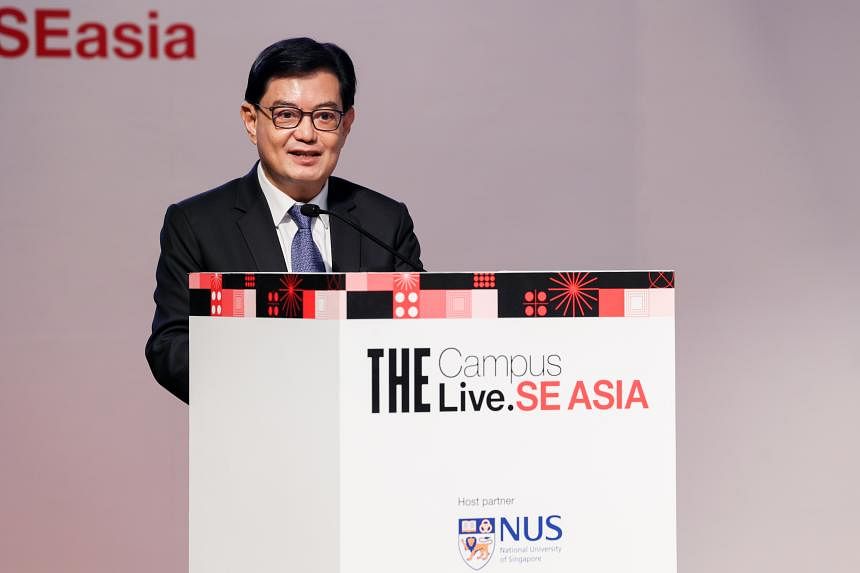SINGAPORE – Instead of being a one-time launch pad, educational institutions can become more like pit stops where workers can periodically return to refuel throughout their working life, said Deputy Prime Minister Heng Swee Keat on Wednesday.
Emphasising the need for the higher education sector to evolve, he added that universities must respond to developing trends such as continuing education and digitalisation.
One big shift is towards lifelong learning and preparing workers for disruptions in their careers, he said, as emerging technologies such as automation reshape the future of work rapidly.
“Even before the student receives his graduation certificate, the currency of his knowledge and skills is already starting to erode,” added Mr Heng, addressing nearly 300 delegates at the inaugural THE Campus Live SE Asia 2022.
The two-day event is organised by Times Higher Education and hosted by the National University of Singapore (NUS).
“To respond to these trends, we will need to continuously develop each individual across different stages of life,” he noted.
Tertiary institutions in Singapore, including NUS, now provide modular, bite-size courses for adult learners in emerging areas such as advanced manufacturing and artificial intelligence.
“But lifelong learning is not easy to do, and we will need to continue to experiment with different modalities, leveraging on technology to help adult learners balance their various priorities,” he said.
At the same time, a broader view of education is needed, added Mr Heng, who is also Coordinating Minister for Economic Policies.
In Singapore, access to universities has grown over the past few decades, allowing more people to pursue their interests, he noted.
“But even though universities play a key role, there are other important pathways for individuals to develop their potential, in a more diversified and complex global economy, and (at a time when) a much wider range of skills (is) needed,” he said.
To help each student fulfil his potential, there is therefore a need to develop different educational pathways, different paths to success, he noted.
“An overly narrow focus on universities alone can lead to an unhealthy and expensive paper chase, which may not always result in good outcomes for individuals or society.”
Hence, Singapore has introduced more porosity across its education pathways, he said. “There are students who went through the Institute of Technical Education and polytechnic, before eventually pursuing a degree programme.”
Mr Heng also challenged university leaders in the region to work together to solve real-world issues with their research.
“One example is climate change, which is an existential challenge that we all face. The potential for nature-based solutions in South-east Asia is tremendous, as our region is home to the largest blue carbon stock in the world,” he added.
Beyond institutions and faculties, students have also been encouraged to explore the region through study trips or internships, said Mr Heng.
“Prior to Covid-19, we set out to enable 70 per cent of all students to have an overseas experience, of which 70 per cent will be in South-east Asia, China or India. With the pandemic receding, our institutes of higher learning will continue to work towards this goal.”
Students, professionals or researchers from around the region are also welcome to explore opportunities in Singapore, he added, noting that NUS has close to 2,000 students from South-east Asia.
Held at University Town on the NUS campus, the event features discussions on current topics of interest such as emerging priorities among universities.
The series is organised across different regions in the world – including Britain, Japan and the United States – with the session in Singapore being the first for this region.


